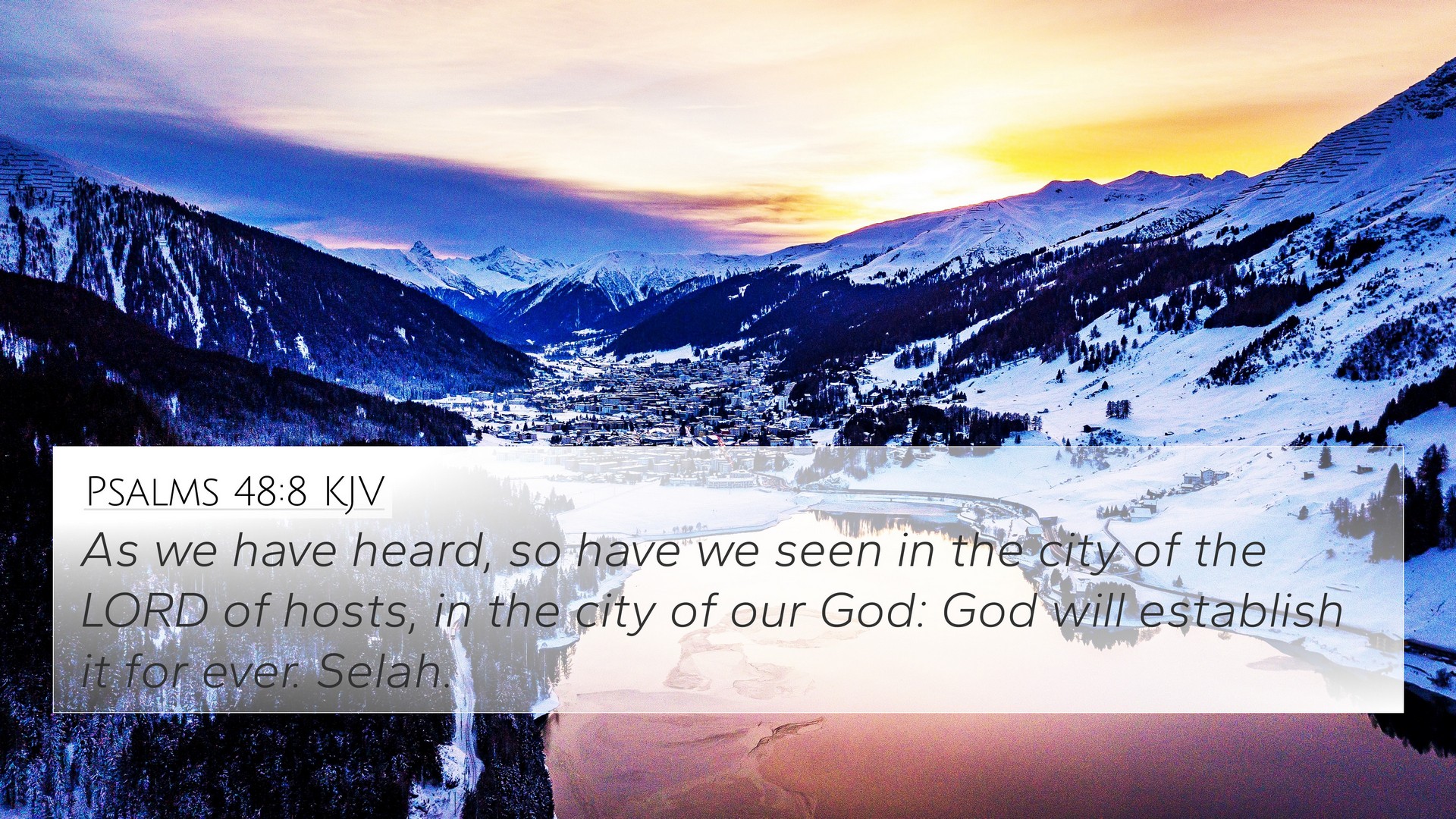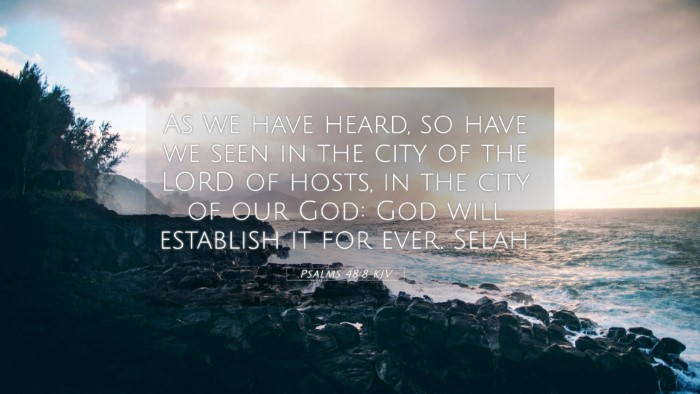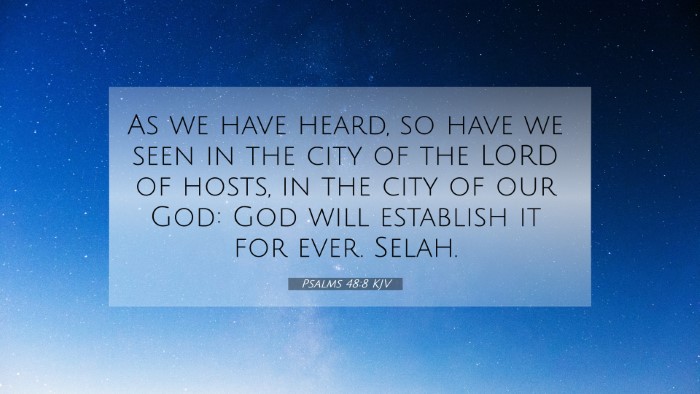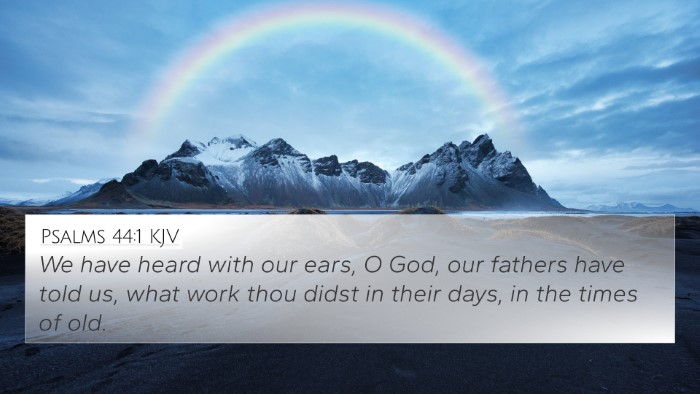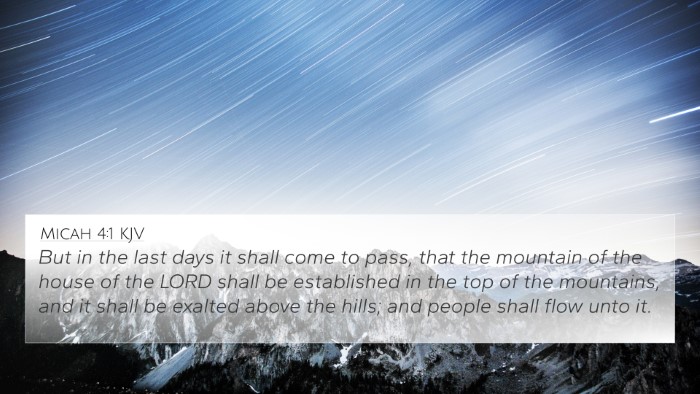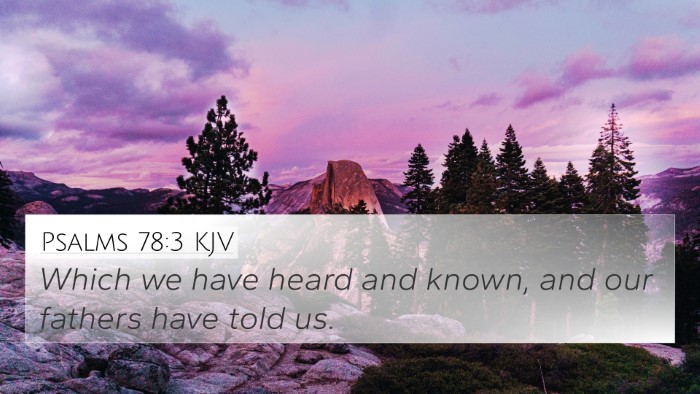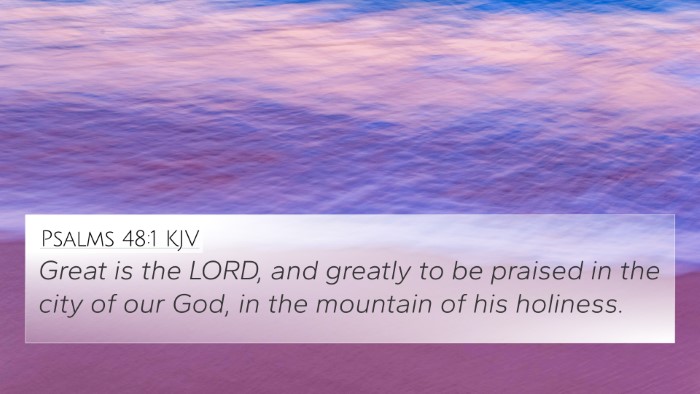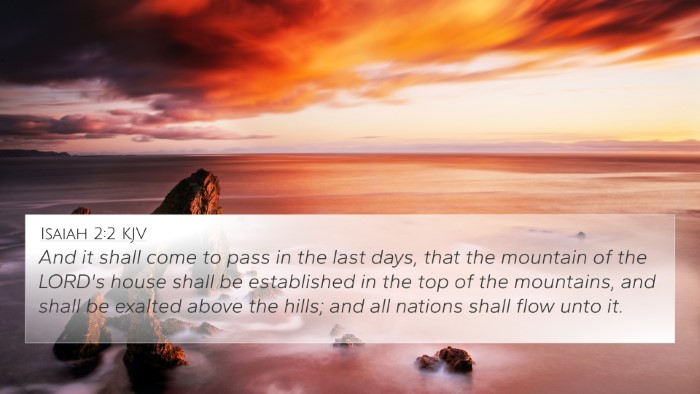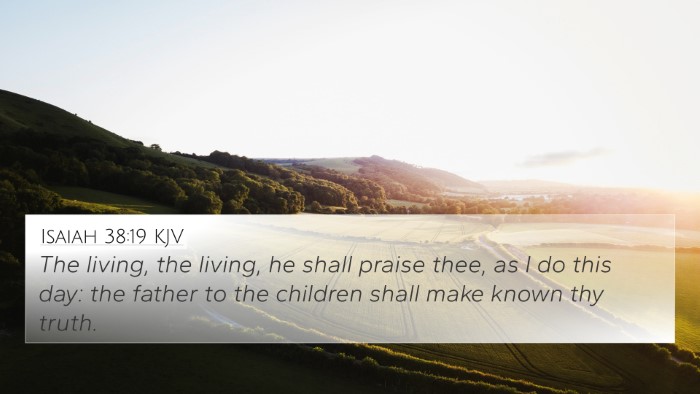Psalms 48:8 - Summarized Meaning and Interpretation
Psalms 48:8: "As we have heard, so have we seen in the city of the Lord of hosts, in the city of our God: God will establish it for ever." This verse poetically captures the enduring nature and greatness of God's presence among His people, specifically within the city of Jerusalem.
Insights from Public Domain Commentaries
Overview
This verse emphasizes both the acknowledgment of historical truths and the confidence in God’s ongoing protection and establishment of His city. Multiple commentaries, including Matthew Henry, Albert Barnes, and Adam Clarke, explore these themes, presenting a coherent understanding of the verse’s implications.
Matthew Henry's Commentary
Matthew Henry highlights the significance of Jerusalem as the city where God dwells. He notes that the testimonies of its grandeur are not merely hearsay but are confirmed by experience. The phrase "God will establish it for ever" underscores divine assurance, signifying that God’s presence and the safety of Jerusalem are guaranteed by His promise, showcasing the eternal security granted to the faithful.
Albert Barnes' Examination
Albert Barnes suggests that the confidence expressed in this verse results from having seen manifestations of God's glory and power. The phrase “as we have heard” emphasizes the testimony of faith that passes through generations. Barnes notes that God's establishment of the city is both physical and spiritual, suggesting that the essence of God's promises transcends worldly constructs, reinforcing the significance of Jerusalem as a spiritual promise for believers.
Adam Clarke's Insights
Adam Clarke elaborates on the historical backdrop of this psalm, inferring that the psalmists recount not just their experiences but invoke a collective remembrance among the people of God. His interpretation emphasizes the connection between hearing and seeing as a typology for faith—first we hear God's word, and then we see its practical outworking in our lives. Clarke further emphasizes the assurance that lies in the certainty of God’s promises, highlighting that while the physical city might face destruction, the spiritual significance remains intact.
Cross-References for Psalms 48:8
This verse finds its roots and echoes throughout the Scriptures. Here are several biblical cross-references that provide thematic connections:
- Hebrews 13:14: "For here have we no continuing city, but we seek one to come." - This aligns with the eternal promise seen in Psalms 48:8.
- Revelation 21:2: "And I John saw the holy city, new Jerusalem, coming down from God out of heaven..." - Indicates the culmination of God's promise regarding Jerusalem.
- Isaiah 54:10: "For the mountains shall depart and the hills be removed; but my kindness shall not depart from thee..." - God’s unwavering kindness mirrors His steadfastness in establishing His city.
- Psalm 125:1-2: "They that trust in the Lord shall be as mount Zion, which cannot be removed, but abideth forever." - A parallel assurance of God's protection similar to Jerusalem.
- 2 Samuel 7:16: "And thine house and thy kingdom shall be established for ever before thee..." - This correlates with the promise of God’s eternal establishment referenced in Psalms 48:8.
- Jeremiah 31:40: "And the whole valley of the dead bodies, and of the ashes, and all the fields unto the brook of Kidron..." - Illustrates God's unwavering commitment to the land and city He has chosen.
- Luke 21:33: "Heaven and earth shall pass away: but my words shall not pass away." - Reinforces the eternal promise of establishment, coinciding with Psalms 48:8.
- Psalms 46:4: "There is a river, the streams whereof shall make glad the city of God..." - Provides context to God’s presence within the city.
- Email the rope to John 3:16: "For God so loved the world..." - Reflecting God’s eternal love paralleled in the context of establishing His city.
- Psalm 9:7: "But the Lord shall endure forever: he hath prepared his throne for judgment." - The eternal dominion of God signifies the same enduring theme in Psalms 48:8.
Thematic Connections
This verse intertwines with various Biblical themes that echo God’s loyalty, the establishment of His kingdom, and the endurance of His promises. Understanding Psalms 48:8 serves as a compelling foundation in cross-referencing and exploring other Scriptures:
- The Assurance of God’s Kingdom: Many biblical texts reaffirm God's everlasting kingdom, influencing how believers approach their faith.
- The Presence of God: Numerous verses elucidate God's palpable presence in our lives, drawing parallels to the establishment of Jerusalem.
- The Role of Faith: Faith is a recurring theme; many Scriptures encourage believers to trust in God's eternally established plans.
- Divine Protection: Various verses throughout Psalms reference God's role as protector, resonating deeply with the assurance of safety found in Psalms 48:8.
- Historical Testimonies: Many biblical accounts reference the testimonies and experiences of faith, linking back to the foundational truths expressed in this verse.
- New Testament Fulfillment: The themes present in Psalms 48:8 are echoed in the New Testament, showcasing the transition of divine promise from Old to New.
- Hope and Comfort: The overarching message of hope in God’s promises is a recurring theme that brings comfort to believers across biblical texts.
Conclusion
Psalms 48:8 stands as a profound declaration of God’s faithfulness and the eternal establishment of His city. The combination of insights from noted commentaries enhances our understanding of the depth and richness of this passage. By drawing connections through biblical cross-references, believers can experience a deeper appreciation of God’s steadfast promises, understanding how these eternal themes maintain relevance across the Old and New Testaments.
SEO Keywords: Bible verse cross-references, connections between Bible verses, linking Bible scriptures, comparative Bible verse analysis, Bible verses that relate to each other, cross-referencing Biblical texts, thematic Bible verse connections, Bible verse parallels, scriptural cross-referencing, inter-Biblical dialogue.
